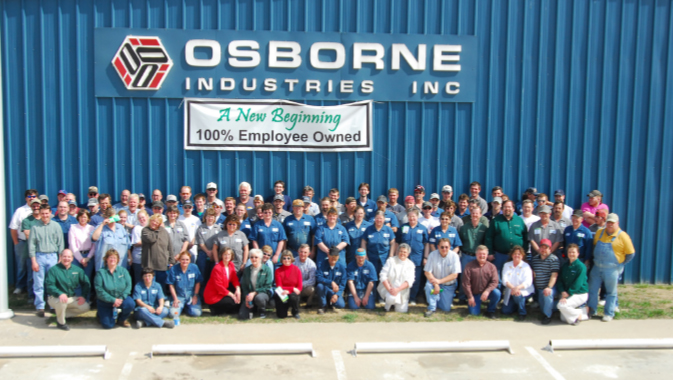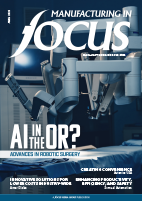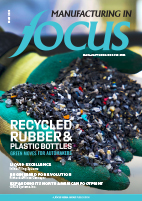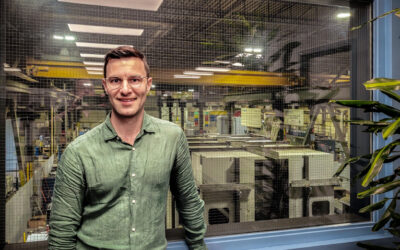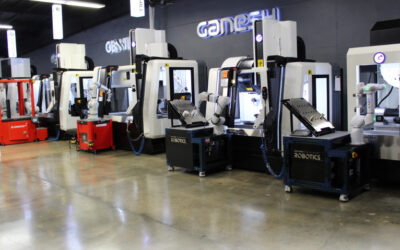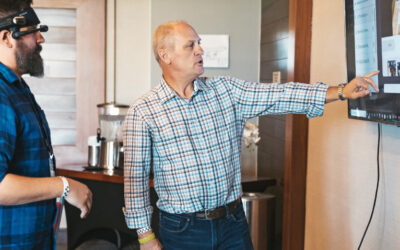Osborne Industries, Inc. is on a mission. That mission involves more than just doing excellent custom molding work, although that is certainly central to the company’s operations. Osborne’s broader mission is to provide good manufacturing jobs in a rural area with limited work prospects. Based in Osborne, Kansas, the company, named for its hometown, is now completely employee owned and proud of its products, services, and heritage.
“Our purpose and reason to be here in Osborne is to help preserve our community and provide employment opportunities for Osborne and the surrounding communities. That’s really been our mission from the very early days,” says Sales and Marketing Manager Amy Conrad.
The company exports to more than forty countries around the world, “an impressive achievement for a small Kansas manufacturing firm,” she adds proudly.
The company makes plastic parts through two main molding processes: resin transfer molding (RTM) and reaction injection molding (RIM). It also designs and sells a line of proprietary agricultural products primarily for livestock management and some products for pets.
The custom molding side of the business covers an extensive range of clients and projects. The company has made parts such as fenders and shrouds on military vehicles, machine coverings, forklift bumpers, and medical bed tubs, to name a few. Some of the medical beds for which it supplied parts were used to treat burn victims after the terrorist attacks of 9/11.
Parts vary in size from a couple of pounds to “as big as one thousand pounds,” says Conrad. “We take the designs of our customer or help the customer with their design and product specifications. We build to our customer’s specifications any time we’re doing a custom project.”
Most of what Osborne Industries does is performed in-house. The firm has mold building, mold repair, and tool and die departments and can do its own mechanical property testing. Only a few things, such as specialty parts or services, are subcontracted out.
“The company aims to be as self-sufficient as possible given its rural locale,” says Marketing Representative Jim Hindman. Indeed, Osborne’s location in a bucolic part of Kansas means that there is a limited network of local manufacturing partners with which it can share work and resources. Limited economic opportunity was the main reason the company was set up.
The company was established in 1973 by “a group of city leaders, with the vision to preserve a small rural community by providing employment opportunities in north-central Kansas,” explains the company website.
At the time, farm operations were becoming bigger but required fewer workers due to advancements in technology and improved equipment. With area farm jobs dwindling and people leaving the community in search of work, setting up a manufacturing facility seemed like a good way to create jobs and help maintain the community.
When the founders started the company, “they didn’t know exactly what they were going to make. The buzz back in the 1970s was that plastics were going to change the world. That led them down the path to eventually what we’re doing here today,” Conrad says.
In the very early years, the company was focused on a single product: a heating mat.
“They started doing a closed molding process and learned later that the name for it in the industry was resin transfer molding,” says Hindman.
The company then began building its portfolio of proprietary product lines for the agriculture sector. The company owners soon realized the challenges that came with relying on one industry for the livelihood of a small business in rural Kansas, so they set out to diversify the company by doing custom molding work for major original equipment manufacturers (OEMs) like John Deere and Textron, Inc.
The custom-molding segment expanded, and Osborne Industries developed a reputation for delivering quality custom molding solutions. In the mid-1990s, it introduced a new process, called reaction injection molding (RIM), in response to a major need by the military for FMTV fenders. Its RIM molding capabilities have expanded to include a multitude of projects using a variety of materials such as polyurethanes and polydicyclopentadienes (pDCPD). Resin transfer molding, however, still makes up the largest percent of the company’s custom molding work today.
Over the years as the company grew, the majority ownership was held by two brothers who stayed with and managed the business since the early years. Outside buyers expressed interest in purchasing the company as the brothers approached retirement age; however, the problem was that outside ownership “could jeopardize the whole purpose of Osborne Industries being founded in the first place,” recalls Conrad. “A new owner could move the company out of Osborne, which would also negate the original intent behind its founding.”
In the end, the owners decided not to sell to a private entity. Instead, they introduced an employee stock ownership plan (ESOP), which allows employees to own shares in the company. By March 2007, Osborne Industries had become 100 percent employee owned.
The ESOP has been a huge success; employees appreciate that the harder they work, the more the company benefits, which helps everyone financially. Having an ESOP is a point of pride for employees and serves as a lure for job seekers, says Conrad.
When it comes to hiring, the company tries to make room for a broad range of prospective employees.
“Being in such a rural area and having so many different departments, we have positions for pretty much any skill level, from machine operators on the production floor to Ph.D. research chemists developing new materials and resin systems. We have our own in-house engineering staff for both mechanical and electrical engineering. We have, of course, a sales staff both in-house and outside. Because of the different types of jobs we offer, [many] types of people can work here,” says Hindman.
Osborne Industries has been ISO certified for nearly two decades. In November 2018, the company received its most recent approval to ISO 9001:2015 standards. To maintain ISO certification, the company follows a comprehensive quality management system.
“Every single part we manufacture has detailed work instructions. Included in these instructions are all of the necessary quality requirements, whether that be critical dimensions, color, special labeling, or mechanical properties,” states Conrad.
The company will take all first article parts to verify dimensional accuracy and perform mechanical properties testing, both part of a standard first article inspection (FAI) protocol. The latter is done “to make sure our resin formulations and composites are all meeting the mechanical properties required,” notes Conrad.
Customers seem to appreciate this attention to detail. This May, the company won a quality, cost, delivery, and sustainability (QCDS) award at the Altec Supplier Summit, a regular event organized by the utility-vehicle manufacturer. Osborne has been supplying components to Altec for decades.
“The QCDS is awarded to their very top-performing or top-tier of suppliers, so it was definitely an honor to be recognized by them again,” says Conrad. “We’ve been a long-time supplier and partner with Altec Industries. I believe this is the third award we’ve received from them in the past decade.”
Osborne promotes itself through in-person events, online activities, and media advertising. “For the custom molding business, there are various trade shows we attend. We also put a lot of attention on our websites work, focusing on blog posts, for example, to ensure we continue to drive organic traffic to our websites,” Conrad says.
The company recently joined the Farm Equipment Manufacturers Association (FEMA) to network and gain industry insights. It is also very involved with community groups and philanthropic initiatives, where its workers serve as volunteers with civic organizations, clubs, and youth groups. The company financially supports several charitable endeavors, as well.
“Since we have a team of employee owners, our commitment to the community in our rural area is very important to us,” says Hindman.
“One of our biggest donations this year was to a fundraising event for a new community pool,” adds Conrad. “In the past, we’ve played a big part in the development of a golf course, a public library, a baseball complex, and so forth. Those types of community projects are important to our company. We host an in-house blood drive to increase the number of participants from our company to that cause.”
Like many companies, Osborne Industries’ biggest challenge is dealing with an aging workforce. “As baby boomers exit and retire over the next ten years, or so, we have to do our work to ensure that we have new leaders to take their place. That’s a focus for our company right now,” she states.
Introducing new products, materials, and technologies is another area of attention. “We’re constantly reviewing market needs and definitely have some exciting products and materials that are being tested right now that will hopefully open up more opportunities in the various markets that we serve,” says Conrad.
Osborne Industries is determined to “hold true to the reason why we became a company in the beginning, and that’s to ensure we remain profitable. Remaining profitable ensures we’re able to continue to offer employment opportunities for our community and the surrounding communities here,” she adds.

